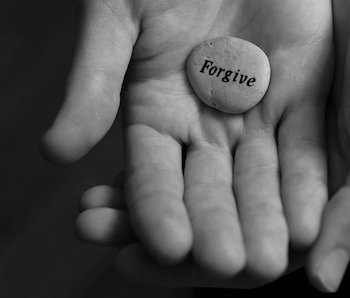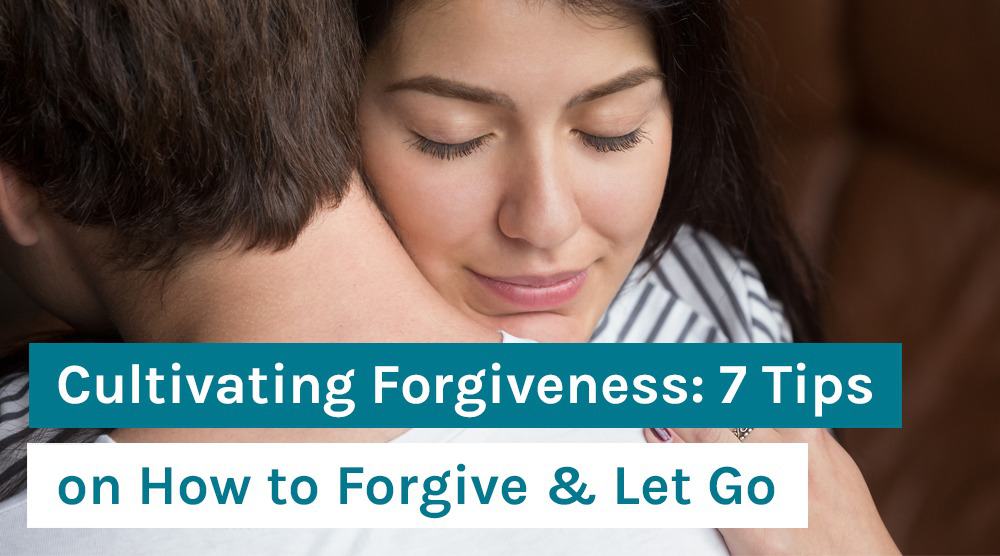Cultivating Forgiveness: 7 Tips on How to Forgive & Let Go
In a hurry? Click here to read the Article Summary...
Forgiveness. It seems a simple concept, but for some, forgiving a person who has done them wrong can be challenging because it requires potential confrontation and demands courage. Yet there are many reasons to consider forgiving those who have hurt us.
This article will share powerful reasons for practicing forgiveness, along with tips on how to forgive to help guide you through the process.
Why Should We Forgive?
The sense of peace and spiritual well-being that comes from forgiving another can be quite powerful. Letting go of old wounds can be liberating, transformative, and healing – both for ourselves and for the person we forgive.
Holding onto resentment and repressing anger can have some wide-ranging negative effects on our physical, spiritual, mental, and relational well-being. And the person most hurt by this anger and resentment? The one holding the grudge.
According to author Gerald Jampolsky:
“Forgiveness is an inner correction that lightens the heart. It is for our peace of mind first. Being at peace, we will now have peace to give to others, and this is the most permanent and valuable gift we can possibly give.”
Our spiritual teachers have much to tell us about how to forgive. In the Christian Bible there are many passages which discuss forgiveness. One of the most famous comes from Matthew 18:21-22, in the parable of the unmerciful servant:
Then Peter came to Jesus and asked, ‘Lord, how many times shall I forgive my brother or sister who sins against me? Up to seven times?’ Jesus responded, ‘I tell you, not seven times, but seventy-seven times.’
Why Forgiving Another Is So Difficult
 Often the hardest part of the forgiveness process is understanding why we should do it in the first place. While we may believe that we should forgive, it can be a step that is exceptionally difficult, and requires us to dig deep. That can be painful, so we resist it.
Often the hardest part of the forgiveness process is understanding why we should do it in the first place. While we may believe that we should forgive, it can be a step that is exceptionally difficult, and requires us to dig deep. That can be painful, so we resist it.
One reason for this resistance is that our brains are wired to protect us. We tend to hold on to resentment, mental anguish, and trauma because we need to be able to remember threats to our safety and well-being.
However, when we live in a state of unforgiveness, we hold that negative energy in our bodies and it can create havoc. This body-mind connection was commonly accepted centuries ago. King Solomon is credited with saying “Eliminate anger from your heart and remove harm from your flesh.”
This references the notion that harboring resentment is detrimental to the body as well as the spirit. It turns out this is more than a notion – it has been confirmed by a number of studies.
Science Shows Unforgiving Attitudes Can Lead to Poor Health
Thousands of studies have been conducted on forgiveness. It is actually one of the hottest fields of research in clinical psychology.
Everett Worthington Jr., a clinical psychologist and researcher who has spent the better part of two decades of his career studying forgiveness, says that forgiveness is not about forgetting or pardoning an offense. It’s about replacing negative feelings with feelings of care and compassion and a genuine desire for reconciliation. He has also advised,
“…every time you feel unforgiveness, you are more likely to develop a health problem.”
Worthington says there’s good reason for adopting a forgiving attitude and making it a way of life. Describing a study he conducted to determine whether people’s stress levels were related to their ability to forgive a romantic partner, he states:
“We measured levels of cortisol in the saliva of 39 people who rated their relationship as either terrific or terrible. Cortisol is a hormone that metabolizes fat for quick response to stress (and after the stress ends, deposits the fat back where it is easily accessible – around the waist).
People with poor (or recently failed) relationships tended to have higher baseline levels of cortisol, and they also scored worse on a test that measures their general willingness to forgive. When they were asked to think about their relationship, they had more cortisol reactivity – that is, their stress hormone jumped. Those jumps in stress were highly correlated with their unforgiving attitudes toward their partner.
People with very happy relationships were not without stresses and strains between them. But forgiving their partner’s faults seemed to keep their physical stress in the normal range [1].”
Holding in Anger Also Harms Your Health
Other studies have shown that chronically-suppressed anger compromises health, resulting in elevated heart rate and blood pressure, and an impaired immune system.
One study investigated the physical responses resulting from study subjects thinking about someone who had mistreated, hurt, or offended them. While the subjects thought about these transgressions, their heart rate, blood pressure, sweat gland activity, and facial muscle tension were monitored.
Not surprisingly, when study subjects thought about these old offenses, their heart rate and blood pressure soared, and they sweat more. They described feeling sad, angry, anxious, stressed, and less in control. When the subjects were asked to try to empathize with their offenders or imagine forgiving them, those symptoms of physical arousal diminished significantly [2].
A small 2014 clinical study investigated the efficacy of adopting a forgiving attitude. The study subjects were women diagnosed with fibromyalgia and who were abused in childhood by their biological parents. Researchers found that for these subjects the forgiveness intervention was helpful for improving overall fibromyalgia symptoms, and in decreasing levels of anger [3].

Rewiring Your Brain for Forgiveness
We experience heightened states of stress when recalling the details of old grudges because the brain cannot tell the difference between a real or recalled event. It reacts to all these negative thoughts as if they were happening to us now.
This starts a cycle of stress, which is like dumping toxins into our bodies. It drains us of energy, it poisons the mind, it undermines the immune system, and it poisons other relationships.
Brain research shows that when a thought pattern or behavior is reinforced, the brain quickly adapts by building and deepening neural pathways to support this.
If a person is constantly reinforcing feelings of anger, bitterness, and/or thoughts of revenge, the neural pathways for that pattern of thinking will strengthen. This makes a person predisposed to be even more angry and bitter.
But the good news is… all of this can be undone. Don’t let anger become a way of life. By adopting a forgiving attitude, more compassionate thoughts, and opening the mind to love and healing, neurons in the brain begin rewiring for this new way of thinking. The more frequently this more positive frame of mind is exercised, the stronger the pathways become.
Here is the important take-away: The brain dismantles the pathway that is not used as frequently in favor of reinforcing the one that is. It’s up to us to decide which we would like to strengthen.
Being free of resentment and grudges improves health, decreases stress, and improves our chances for happiness. All the energy that was being used to keep resentment and anger alive is released and becomes available for more positive things.
Author Isabelle Holland has this to say about unforgiveness:
“As long as you don’t forgive, who and whatever it is will occupy rent-free space in your mind.”
7 Tips on How to Forgive
There are 7 stages to cultivating a mind more wired for forgiveness than grudges. Each person may experience this differently, but this is a general guide for the forgiveness process.
#1: Make a Commitment to Reconcile
Once you have decided you wish to forgive, make the commitment to do just that. Forgiving does not mean we have to like the person we are forgiving. We do not have to be their friend or see them again.
Forgiving a wrongdoer also does not mean that we free them from the societal consequences of what they did wrong. Forgiving means that we free the offender and ourselves from the negative energy held between us.
#2: Take Time to Recall the Event
Think about the other person’s actions, how you reacted to them, and how they made you feel. Get in touch with your feelings since the event and how they may be coloring the person you are now.
#3: Develop Compassion and Empathy
We rarely know everything going on in the lives of others. Do your best to cultivate feelings of empathy for the transgressor. Put yourself in their shoes for a few minutes. See if you can get to a place where you understand that no one is perfect, that we all make mistakes.
#4: Forgive Others
You can take several courses of action here, or just one. You can write a letter. You can create a little ceremony with only you in attendance where you genuinely and deeply forgive the person. You can keep a forgiveness journal or even write a book. You can pay a visit and forgive in person.

Whatever you choose, make it meaningful to you so that healing can begin. Give it some thought; only you can decide what is right for you in each circumstance.
#5: Let Go of Expectations
If you acknowledge that you have forgiven someone, don’t expect an apology that may never come. Let go of any expectations and forgive because you are ready to do so.
#6: Forgive Yourself
It’s important that you include yourself in the act of forgiving. We often blame ourselves even more than others when something negative or traumatic occurs. If you feel you did something wrong, acknowledge it and then let it go.
#7: If Necessary, Seek Professional Help
Once you have decided to forgive someone, it may be necessary to get some professional help, particularly if the event was traumatic. If recall causes you to lose sleep, have recurrent negative thoughts, or does not ease after following these tips, be sure to seek professional counseling to help you through any difficult period.
Pastor, author, and filmmaker T.D. Jakes has this to say about forgiveness: “Unforgiveness, unchecked, becomes a cancer in our soul.” In an interview with Oprah, Jakes stated:
“If you are going to spend all that energy energizing where you’ve been, then you are not going to have the fuel and the fire and the tenacity and the aggressiveness that you need to energize where you are going. It takes more strength to forgive than it does to be vengeful and angry. Forgiveness is the gift you give yourself.”
The Navajo people of the American southwest have an old saying: “When you point a finger at someone, there are three fingers pointing back at you.”
The meaning of this saying will differ wildly between people, depending upon their background and beliefs. One possible interpretation is that whatever we send out in the world is also visited upon us with more intensity.
For instance, when pointing the finger at another, although we may not necessarily be to blame for any wrong that has been done to us, did we hold a grudge, refuse to forgive the wrongdoer, or hold another to a higher set of standards than we hold for ourselves?
Something to consider as you ponder what painful experiences from your past that you’re still holding on to. Is it finally time to forgive and let these emotional burdens go once and for all?
Magnesium deficiency is linked to stress, diabetes, heart disease, osteoporosis, chronic fatigue syndrome, depression, anxiety, trouble sleeping, sore muscles, migraines, and many more debilitating health conditions.
If your body needs magnesium, you want the most beneficial kind your body can actually absorb. New Organixx Magnesium 7 gives you seven (7) of the very best, most bioavailable types of elemental magnesium available.

 Sources:
Sources:
Article Summary
Holding onto resentment and repressing anger can have wide-ranging negative effects on our well-being.
Our brains are wired to protect us by reinforcing negative feelings about painful scenarios.
Chronically suppressed anger compromises health.
Neural pathways can be rewired to reinforce healthy trends of forgiveness.
7 tips for cultivating forgiveness:
- Make a commitment to reconcile
- Take time to recall the event
- Cultivate compassion and empathy
- Forgive others
- Let go of expectations
- Forgive yourself
- Seek professional help




Remember that you have wronged someone in the past. He/she forgave you. The Almighty forgives us our sins, even when we do not repent our sins.